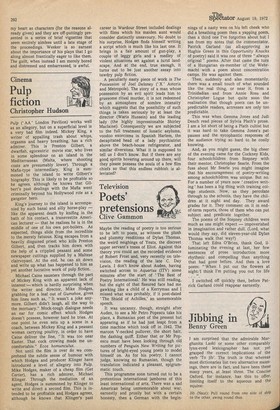Television
Poets' pretensions
Clive Gammon
Maybe the reading of poetry is too serious to be left to poets, as witness the plush and plummy renditions of Dylan Thomas, the weird neighings of Yeats, the discreet upper servant's tones of Eliot. Against this theory you could set the recorded evidence of Robert Frost and, very recently on television, the reading of the late C. Day Lewis. I don't know about Auden, having switched across to Aquarius (ITV) some minutes after the start of 'The Best of Poetry International.' He was still reading, but the sight of that fissured face had me gawking like a child of a Kerryman and I missed what was probably, if it post-dated 'The Shield of Achilles,' an unmemorable speech.
It was uncanny, though, straight after Auden, to see a Mr Petro Popescu take his place, a Rumanian poet of the present but appearing as if he had just leapt from a time machine which took off in 1942. The maroon V-necked pullover, the short hair, the dashing quiff. Either that or Mr Popescu must have been looking through old numbers of Penguin New Writing for pictures of bright-eyed young poets to model himself on. As for his poetry, I cannot judge, knowing no Rumanian, though the translation indicated a pleasant, epigrammatic touch.
This programme soon turned out to be a pretentious international jamboree of this least international of arts. There was a sad American being unmemorable about war, earnestly and prosily but with a certain honesty, then a German with the begin
flings of a nasty wen on his left cheek who did a breathing poem then a yapping poem, then a third one I've forgotten about but I see from my notes that the commentator, Patrick Garland (as all-approving as Hughie Green in this Opportunity Knocks of poetry) said it was one of three "always original " poems. After that came the turn of a Hungarian ex-member of the Wehrmacht with a poem about concentration camps. He was against them.
Then, suddenly and alas momentarily, there was a small touch of what sounded like the real thing, or near it, from a Trinidadian and from Annie Ross and Christopher Logue but quite soon the realisation that though poets can be unpredictable readers, actresses are only too predictable.
This was when Gemma Jones and Judi Dench read pieces of Sylvia Plath's prose. I am a lot short of being a Plath cultist but it was hard to take Gemma Jones's pat pauses and the sycophantic responses of the audience trying so hard to be cosily knowing.
And, as you might guess, the big cheer of the evening came for the Cockney Kids, four schoolchildren from Stepney with their mentor, Christopher Searle. From the fuss about Mr Searle you might imagine that his encouragement of poetry-writing among schoolchildren was unique. But no. For a number of years now 'creative writing' has been a big thing with training college students. Now, as they percolate through to the schools, they have the children at it night and day. They award grades for it. They comment on it in endof-term reports, those of them who can put subject and predicate together.
The poems of the Stepney children were much as one might expect — impoverished in imagination and rather dull. (Lord, what would they say, did eleven-year-old Dylan Thomas walk that way?) That left Edna O'Brien, thank God, illuminating the evening at last, her few sentences of prose introduction more rhythmic and compelling than anything that had gone before. And then a love poem: "When I put out the flowers at night/I think I'm putting you out for life I switched off quickly then, before Patrick Garland could reappear earnestly.
































 Previous page
Previous page